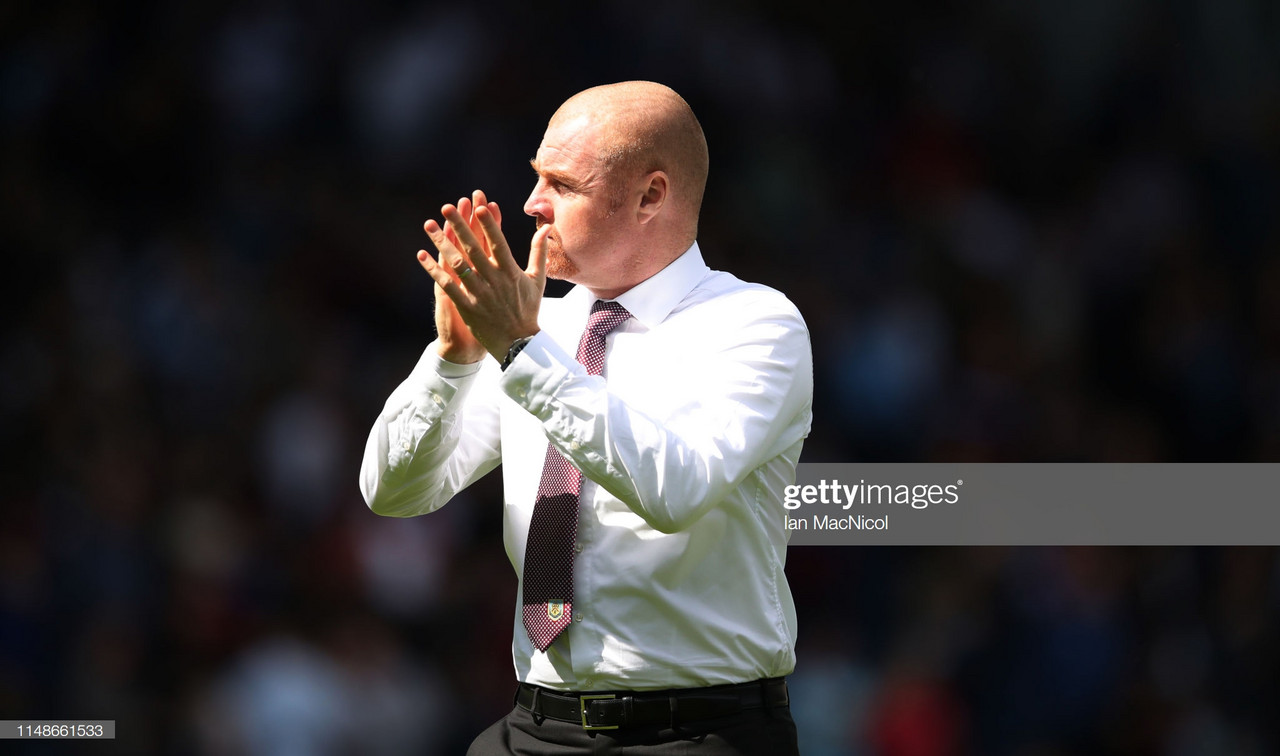Burnley started the 2018/19 season in the Europa League but at times they were staring at a return the Championship.
Sean Dyche's men endured a torrid first half of the season, but the New Year saw a decisive turnaround.
Here, VAVEL UK looks back on how they hauled themselves to safety.
Transfer Business
Struggle for signings
Ben Gibson joined from Middlesbrough for a joint club-record fee in the summer but was limited to just five appearances across all competitions. His scant contribution can be predominantly blamed on an injury sustained at the end of August which kept him out until November. Thereafter, he couldn’t wrestle establishing pairing James Tarkowski and Ben Mee from their starting roles and largely watched on from the sidelines.
Matej Vydra, an £11million acquisition from Derby, enjoyed considerably more game time, notching 17 appearances, but he could only contribute two goals, a sharp drop-off from his impressive Championship numbers.
Of all the new arrivals, Joe Hart’s involvement was the most significant. The former England number one started all of Burnley’s first 19 league matches, but he was promptly dropped to the bench on the return of Tom Heaton. Hart’s last league outing was a 5-1 home defeat against Everton which left his side in the relegation zone. Within three games, they were up to 15th, underlining Heaton's importance.
The January signing of veteran Peter Crouch was always little more than a punt, and it brought little reward. Crouch made six substitute appearances but didn’t manage to find the net.
Story of the season
Burnley’s fantastic seventh-placed finish in 17/18 resulted in a very early start to the campaign with a trip to Aberdeen for a Europa League qualifier on 25 July.
A 1-1 away draw, followed by a 3-1 home win, albeit with the decisive goals coming in extra time, secured passage into the penultimate round, where they met Istanbul Basaksehir. Nothing could separate the sides over 180 minutes, but Jack Cork’s 97th-minute strike at Turf Moor sent Burnley through.
Only Olympiacos stood in their way of a place in the group stages, but after avoiding defeat in the previous away legs they were beaten 3-1 in Greece. A 1-1 draw at home sealed their fate, and their adventure was over before it had begun in earnest.
That continental foray proved a drain on the thin Burnley squad in the first portion of the domestic season.
They kicked off their campaign with a respectable point at Southampton before falling to defeat at home to Watford three days after battling past Basaksehir.
Alarm bells were beginning to sound when the Clarets, usually so resilient defensively, shipped four away at Fulham, and further reverses followed against Manchester United and Wolves.
Then came a pair of very important results: an emphatic 4-0 victory against Bournemouth, which truly ripped up the form book, and a hard-fought win on the road at Cardiff.
But October proved to be a rather grim month, with points dropped at home to Huddersfield prior to drubbings against Manchester City and Chelsea.
November saw a draw and two losses, one of which, at home to fellow strugglers Newcastle, was particularly dispiriting.
Fast forward to Boxing Day and the 5-1 drubbing at the hands of Everton which no doubt marked the low point of the season, confirming the very real possibility of relegation.
The manner of defeat could easily have led to an unravelling, but the response was one of immense character. Dyche’s men, buoyed by the return of the excellent Heaton, rattled off three successive victories against West Ham, Huddersfield and Fulham and finished January by narrowly missing out on victory at Old Trafford
Having faltered against their rivals on a number of occasions earlier in the season, they were now winning the vital games. February saw a win at a slipping Brighton and perhaps their most impressive result of the campaign: a 2-1 win against a Spurs side which still harboured title ambitions.
Home defeats against Crystal Palace and Leicester in March represented a wobble, but nerves were settled with back-to-back wins against high-flying Wolves and Bournemouth.
They realistically knew that beating Cardiff on 13 April would all but secure safety, and sure enough, they prevailed in an evenly-matched contest thanks to Chris Wood’s double. Immense relief took hold at Turf Moor.
And how vital that win was, with Chelsea, Manchester City, Everton and Arsenal completing their run-in.
Burnley lost their last three games but it didn’t really matter. They had dug deep when it counted to see off the looming threat of demotion. Fittingly, they wound up on 40 points, eight places down on 17/18 but six points clear of the bottom three.
Cup competitions
Had Burnley been a few places higher, they could have placed more of an emphasis on the domestic cups as a possible shot at silverware. But ultimately priorities lay elsewhere.
League One Burton Albion dumped them out of the Carabao Cup at the first hurdle, and though they avoided a similar upset against Barnsley in round three of the FA Cup, they rang the changes for their meeting with eventual winners Manchester City and, inevitably, were sent packing.
Player of the season
Some supporters will legitimately feel their most impressive players didn’t quite get the deserved recognition.
Ashley Barnes top-scored for the Clarets with 12 goals, an objectively decent haul for a bottom-half outfit, yet the most attention he received all year was when Liverpool supporters pleaded with him to derail City’s title ambitions.
And what about Dwight McNeil, the exciting young winger who has hit the ground running? Since breaking into the team at the end of December, he has been directly involved in seven goals, or about a quarter of his team's overall tally in that time.
He really ought to have been widely identified as one of the season’s breakthrough talents given the extent of his contribution in a struggling side.
Moreover, their player of the season has as many assists (eight) as David Silva, Bernardo, Roberto Firmino and Heung Min-Son, but the odds are you won’t know that.
Ashley Westwood has been Burnley’s most consistent performer, as his team-mates recognised at the club’s end of season awards.
Westwood only made ten appearances in 17/18, but this year he has been a crucial presence, combining the tirelessness which characterises Dyche’s team with some much-needed creativity.
“His own development, from his knowledge of the game and continued learning, and the culture and environment we set, has combined nicely,” was the manager’s assessment in April.
What’s to come next season?
The dust has now settled, and the relief of survival needs to give way to wariness. This season was a reality check for Burnley after their remarkable achievement in 17/18, an illustration that the sole priority must remain to reach the 40-point marker.
Burnley’s spirit carried them through some difficult moments, but with a fresh batch of ambitious Championship talent on the way, it may not be enough to guarantee long-term safety.
Only investment will do that, and it will have to be significantly improved to avoid another relegation dogfight. They ought to approach this year’s window with higher-level, Premier League-proven targets in mind.
For Burnley, the objective should be that more comfortable 11th-13th bracket. And it’s certainly attainable if they avoid a repeat of this year’s stuttering start.
And there is no doubt whatsoever that they have the right man at the helm to continue their efforts at consolidation.










































